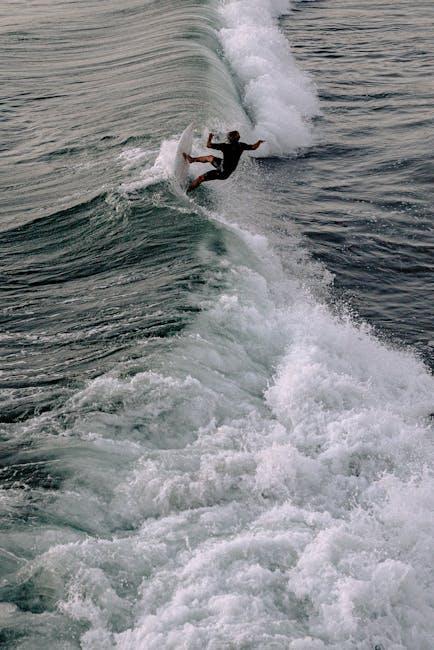In recent years, the global surfing community has increasingly turned its attention to the environmental impact of the sport, sparking a vibrant discussion about sustainability and conservation. Among the many topics being debated, the use of jet skis in surfing competitions has emerged as a focal point. While jet skis have revolutionized safety and accessibility in high-stakes events, concerns about their environmental footprint cannot be ignored. This article explores the compelling arguments for and against banning jet skis in surfing competitions, with an optimistic lens on how the sport can continue to thrive while respecting the oceans that make it possible. By examining innovative alternatives and sustainable practices, we aim to inspire a wave of positive change that aligns the exhilarating spirit of surfing with a deep commitment to environmental stewardship.
Evaluating the Environmental Impact of Jet Skis in Surfing Events
When it comes to surfing events, the environmental impact of jet skis often stirs a heated debate. These motorized watercraft are essential for ensuring the safety of surfers, providing rapid response during emergencies, and assisting with logistics. However, their environmental footprint cannot be ignored. The combustion engines of jet skis emit pollutants, contribute to noise pollution, and can disrupt marine life. Understanding the implications of their use is crucial to making informed decisions about their role in surfing competitions.
- Pollution: Jet skis release emissions that can contribute to air and water pollution, affecting local ecosystems.
- Noise Disturbance: The noise generated by these machines can interfere with marine wildlife, potentially altering their natural behaviors.
- Marine Life Disruption: The presence and movement of jet skis in the water can disturb sensitive habitats and species.
Despite these challenges, advancements in technology offer promising alternatives. The development of electric jet skis could significantly reduce emissions and noise, providing a more environmentally friendly solution. Surfing events can play a pivotal role by encouraging the use of such innovations, fostering a culture of sustainability within the sport. By evaluating and adopting greener practices, the surfing community can ensure the preservation of the oceanic environment while maintaining the thrilling essence of the sport.

Promoting Eco-Friendly Alternatives to Enhance Surfing Competitions
While the roar of jet skis has become synonymous with surfing competitions, there’s a growing movement advocating for more sustainable practices. As the surfing community increasingly embraces environmental consciousness, many suggest replacing jet skis with eco-friendly alternatives. These alternatives not only reduce carbon footprints but also enhance the natural beauty and tranquility of the ocean. Consider the use of electric-powered watercraft that produce zero emissions, or the integration of solar-powered drones to monitor wave conditions and ensure participant safety.
Adopting such sustainable solutions can significantly reduce the environmental impact of surfing events. Here are some potential benefits:
- Reduced noise pollution, allowing marine life to thrive undisturbed.
- Lowered carbon emissions, contributing to cleaner air and water.
- Preservation of natural habitats, supporting biodiversity in ocean ecosystems.
By shifting towards these innovative technologies, surfing competitions can set a powerful example in the fight against climate change, proving that the sport can thrive while prioritizing the health of our planet.

Harnessing Innovation to Balance Sport and Sustainability
In the quest to balance the thrill of surfing with the need for environmental stewardship, the question of whether to ban jet skis from surfing competitions has gained traction. Jet skis, often used to tow surfers into large waves or rescue them from precarious situations, undeniably offer safety and excitement. However, their environmental footprint cannot be ignored. The emissions from fuel combustion contribute to air and water pollution, disrupting marine ecosystems and impacting local wildlife. Moreover, the noise pollution generated by these machines can alter the behavior of marine life, leading to long-term ecological consequences.
Innovative solutions could provide a pathway to sustainability without compromising the safety or competitiveness of surfing events. Some potential alternatives include:
– Electric-powered jet skis: These offer a cleaner alternative, reducing emissions and noise pollution significantly.
– Enhanced rescue protocols: Utilizing skilled lifeguards and traditional rescue methods can minimize the need for motorized assistance.
– Eco-friendly event planning: Incorporating sustainability-focused practices in organizing competitions, such as minimizing waste and promoting public transport, can complement the efforts to protect the environment.
By embracing such innovations, the surfing community can lead by example, demonstrating that it is possible to enjoy the sport’s exhilaration while preserving the oceans we so deeply cherish.

Fostering Community Engagement for Greener Surfing Practices
To truly embrace eco-friendly surfing practices, it’s crucial for the community to unite and explore alternatives to traditional methods. A collaborative approach can lead to the discovery of innovative solutions that reduce our environmental footprint. Community forums and workshops can be organized to educate and engage surfers about the impact of jet skis on marine life and ecosystems. Such initiatives can foster a sense of shared responsibility and inspire surfers to advocate for greener alternatives.
- Engage local surf clubs: Host discussions and brainstorming sessions on sustainable practices.
- Partner with environmental organizations: Collaborate to create awareness campaigns and provide resources.
- Promote eco-friendly competitions: Encourage the use of paddle-ins or electric watercrafts as alternatives to jet skis.
By harnessing the collective energy and passion of the surfing community, we can pave the way for competitions that not only celebrate the sport but also protect the environment. Together, we can make greener surfing practices a reality, setting a precedent for future generations.
In Retrospect
the debate over whether surfing competitions should ban jet skis for environmental reasons is a complex yet vital discussion. As stewards of our oceans, it is crucial for the surfing community to weigh the ecological impact against the operational benefits of jet skis. By exploring innovative alternatives and implementing sustainable practices, we can minimize our environmental footprint while preserving the essence of competitive surfing. The transition may not be without its challenges, but with collective effort and creativity, a more sustainable future is within reach. Let us embrace this opportunity to lead by example, ensuring that the waves we ride today are protected for generations to come.










